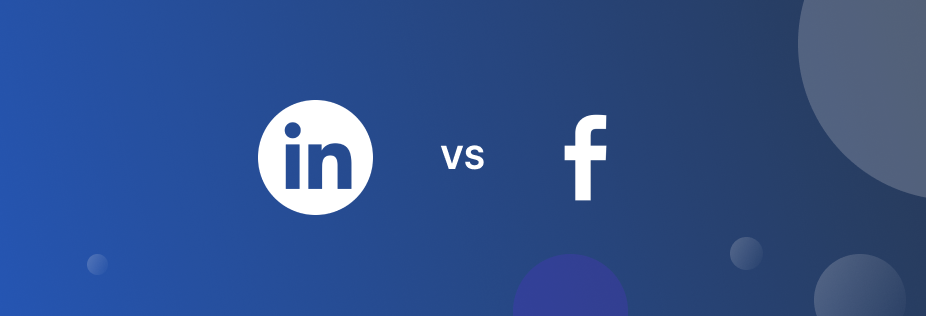The Campainless Blog

As a B2B marketer, it’s likely you’re constantly asking yourself: how should I be delegating my budget? Which channels should I be investing in? Where will I get the best ROI? And when spiralling down this line of questioning you probably find yourself weighing up LinkedIn Ads vs Facebook Ads. Is one more effective than the other? Should I be running both? How much should I be distributing budget to each? It goes on and on. You’re certainly not alone in this line of questioning. That’s why we’re going to lay out all the pros and cons of both channels, so you can make the best decisions for your needs. Let us do the hard work so you can put your mind to other things!
One of the most obvious differences between the LinkedIn and Facebook platforms is the size of their user bases. And their total available reach. It’s no surprise here that Facebook reigns supreme with 2.93 billion monthly active users vs 890 million members on LinkedIn. It’s quite clear cut who has the one up here. Congratulations Facebook! And while the figures don’t lie, it’s important to note that we are measuring the reach of a personal network (Facebook) vs a professional network (LinkedIn), and this should be taken into account.
Winner – Facebook
One of the main reasons why B2B marketers rave about LinkedIn Ads is the precision of the targeting. Through LinkedIn, you can narrow down your audience by a whole range of specific job-related filters beyond location. This includes job title, job function, company size, seniority, interest, member skills, company name and more. Plus, you can leverage lists and lookalikes (a group of people with similar attributes to a list you have). Or target specific companies to execute an effective ABM approach.
Facebook on the other hand, also allows you to target by a number of other valuable filters like location, interests, parental status, life events, education, behaviors and devices. It also enables you to harness lookalikes and lists. However due to the specificity of the job-related filters on LinkedIn, in a B2B context it’s the unrivaled winner when it comes to targeting. Sorry Facebook!
Winner – LinkedIn
Due to the fact that LinkedIn is a professional network, and most users are already in a work mindset when logging on – they’re generally more receptive to B2B advertising. Whereas, on Facebook, they’re likely logged in for entertainment purposes. For example, to check up on a friend’s news, watch funny cat videos or literally anything under the sun. In the second scenario, an ad interruption is less likely to be engaged with in a meaningful way. Because of this LinkedIn has the upper hand.
Winner – LinkedIn
On the topic of Linkedin ads cost vs Facebook there is a clearcut forerunner. Facebook ads are typically substantially cheaper than LinkedIn ads. And this is definitely a benefit of the platform. According to Hubspot Facebook’s average CPC generally sits around $0.97 while Facebook sits much higher at $5.60+. This huge variance does make Facebook the cheaper platform (by a lot). However, if you factor in the quality, and start to look at metrics further down the funnel by source e.g. Cost per Acquisition (CPA), the question of expensiveness gets blurrier.
Winner – Facebook
As LinkedIn is a professional network and the targeting capabilities are far more advanced, you can get your ads in front of exactly the right eyeballs (down to the specific job title). At the right stage in the buying cycle. At the right time. While this may mean it’s more expensive on a cost per click basis, it generally translates into better B2B lead quality. Whereas on Facebook, clicks are cheap but it’s hard to ensure these are on the right people who are likely to convert further down the funnel. LinkedIn – take your prize.
Winner – LinkedIn
Finally, reporting. Both Facebook and Linkedin have quite sophisticated reporting functionalities. And there is a host of helpful features held by both. However, there are some key differences. For example, Facebook allows you to break down by filters like device and platform, while LinkedIn gives you a full demographic support down to the specific job title. As they are so different and yet powerful, it’s probably fair to call this one a draw.
Winner – Draw
We’re done and dusted! You’ve read through a complete dissection of the differences between Linkedin and Facebook broken down by key features. It’s important to take all of the above into account when deciding on which channels to invest in and how you split that budget.
Though LinkedIn is clearly our bread and butter, both channels can be extremely valuable for B2B purposes, each for different reasons. It’s ultimately only through testing with your audience, messaging and brand that you’ll be able to determine which works best for you and for what purpose. Going ahead with LinkedIn? You should check out our world-first LinkedIn ads optimisation tool, Campainless, which makes achieving results a breeze.